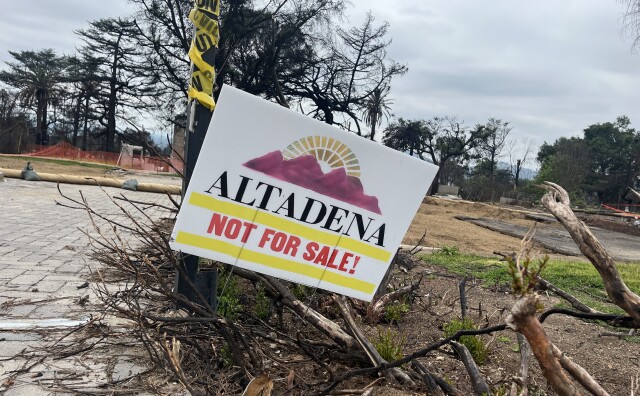Congress has cut federal funding for public media — a $3.4 million loss for LAist. We count on readers like you to protect our nonprofit newsroom. Become a monthly member and sustain local journalism.
On MLK's birthday, memories of a key speech in Los Angeles

As the nation marks Martin Luther King Jr.'s birthday, some Angelenos are recalling a key speech the civil rights leader gave 50 years ago in Los Angeles.
In May, 1964, California was in the midst of its own civil rights battle. Some 15,000 people went to the Los Angeles Memorial Coliseum to hear King speak during a critical moment in the civil rights movement. It was less than a year after his famous "I Have A Dream" speech.
King was introduced by the Rev. Marvin T. Robinson, pastor of the Friendship Baptist Church in Pasadena. “This is a good time to be alive," Robinson said. "Before our own eyes, history is turning a corner."
As King spoke in Los Angeles that day, U.S. Senators in Washington were stalling and blocking the Civil Rights Act.
King talked about the "urgency of the moment” in unlocking the stalemate:
“Now is the time to make real the promises of democracy. Now is the time to open the floodgates of opportunity and allow now an avalanche of justice to pour upon us. Now is the time to get rid of segregation and discrimination. Now is the time to make justice a reality for all of God’s children. This is the challenge of the hour."
Former L.A. County Supervisor Yvonne Brathwaite Burke was at the Coliseum that day. She recalls that, “People were grasping to hear him and excited to hear him and inspired. And it was not an easy time.”
Peter Dreier, a political science professor at Occidental College, says California had the previous year passed a landmark fair housing law, touted as a model for the nation. And not everyone was happy about it.
"As soon as it was passed, the John Birch Society and the California Real Estate Association began a campaign to repeal the law," Dreier says. "They put it on the ballot. And Dr. King in his speech said this was a crucial campaign."
It was the battle over Proposition 14.
"In the state of California, you are facing a great issue and a great choice," King noted. "It is a choice of whether you will continue to move forward. The most populous state that has so often pointed the way. It is a question of whether you will continue to go forward or go backward."
Proposition 14 passed in November with approval from 65 percent of California voters. But by then, events in Washington had begun to set new standards for the nation.
Just 20 days after King’s speech at the Coliseum, President Lyndon Johnson broke the stalemate in the Senate and the Civil Rights Act was passed.
“It was the first major victory of the civil rights movement," Dreier says. "A year later they would pass the Voting Rights Act. And three years after that they would pass the Fair Housing Act."
Two years later, Yvonne Brathwaite Burke was elected California’s first African-American assemblywoman, then the state’s first African-American Congresswoman and finally, L.A. County’s first African-American Supervisor.
Proposition 14 was eventually ruled unconstitutional by both the California and the U.S. Supreme Courts.
King's Los Angeles speech is part of Pepperdine University's Historic Sound Recordings digital collection. It can be heard in its entirety here.
As Editor-in-Chief of our newsroom, I’m extremely proud of the work our top-notch journalists are doing here at LAist. We’re doing more hard-hitting watchdog journalism than ever before — powerful reporting on the economy, elections, climate and the homelessness crisis that is making a difference in your lives. At the same time, it’s never been more difficult to maintain a paywall-free, independent news source that informs, inspires, and engages everyone.
Simply put, we cannot do this essential work without your help. Federal funding for public media has been clawed back by Congress and that means LAist has lost $3.4 million in federal funding over the next two years. So we’re asking for your help. LAist has been there for you and we’re asking you to be here for us.
We rely on donations from readers like you to stay independent, which keeps our nonprofit newsroom strong and accountable to you.
No matter where you stand on the political spectrum, press freedom is at the core of keeping our nation free and fair. And as the landscape of free press changes, LAist will remain a voice you know and trust, but the amount of reader support we receive will help determine how strong of a newsroom we are going forward to cover the important news from our community.
Please take action today to support your trusted source for local news with a donation that makes sense for your budget.
Thank you for your generous support and believing in independent news.

-
Experts say students shouldn't readily forgo federal aid. But a California-only program may be a good alternative in some cases.
-
The program is for customers in communities that may not be able to afford turf removal or water-saving upgrades.
-
More than half of sales through September have been to corporate developers. Grassroots community efforts continue to work to combat the trend.
-
The bill would increase penalties for metal recyclers who possess or purchase metal used in public infrastructure.
-
The new ordinance applies to certain grocers operating in the city and has led to some self-checkout lanes to shutter.
-
Children asked to waive right to see a judge in exchange for $2,500







